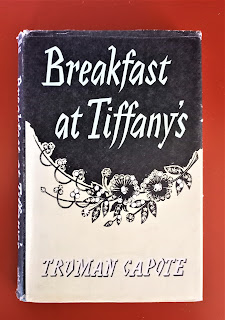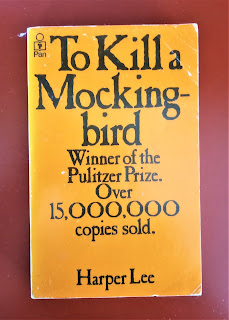Reading - Why do you think so few beloved books become equally beloved films? Do you have a personal list of exceptions?
Gabriel was on the money on Tuesday, pointing out that simply because of scope and scale short stories make for good movies. "Rita Hayworth and the Shawshank Redemption", "The Birds", "Brokeback Mountain". And wasn't 2001 based on a short story too?
I don't have a problem with the cutting that necessarily goes on to turn a 100K word novel into a 90min movie, mind you. If the adapting screenwiter is bold - amputating whole sections, killing (or combining) characters, nixing sub-plots - you end up with a well-shaped movie that might send a viewer to the book to be delighted by more of what they loved. Like deleted scenes in DVD extras. Catch-22 is great example of fearless cutting.
 |
| Chewed corner courtesy of a kitten |
What I do find tiresome is the taming of content to chase a PG rating or to appeal to the pearl-clutchingest slice of potential audience - read straight, white, cis people, basically. When Celie and and Shug Avery were no longer lovers in the film of the Color Purple, or when Idgie and Ruth were no longer lovers in the film of Fried Green Tomatoes, or when there doesn't seem to be any reason that Holly and Paul aren't lovers in Breakfast at Tiffany's* . . . but then look at Cat on a Hot Tin Roof. Why exactly didn't Paul Newman notice that Elizabeth Taylor was cutting about in her underskirt? Tennessee Williams must have been ready to spit.
*I also felt like a chump when I read the book and found out what Holly actually did for a living.
 |
| my gorgeous edition |
When a good book does manage to get turned into a good film - for me - it seems to be when the tone is preserved intact, no matter what happens to the details. (Catch-22 again.)
I Capture The Castle is a novel I adore and I dreaded seeing it on the screen. It's a triumph, translated in all its whimsy and humour and pain.
To Kill A Mockingbird succeeds, I think, because the child's eye view happens to align with the cinema code of the day and so the story is not hobbled by the censor.
 |
| ungorgeous edition - I'm very loyal |
Noir reliably seems to come off pretty well, since it was dominating crime fiction and movies at around the same time and the film noir tradition can be true to itself and to its source material. Farewell, My Lovely is pretty perfect in either medium, I reckon.
Sometimes it's really unexpected and very specific, though. I've always thought High Fidelity was brilliantly adapted from a British book to a Chicago film (except all the names were too Anglo) largely because John Cusack is so well-cast. (Also, Jack Black is in the book as far as I'm concerned now.)
And The Silence of The Lambs has to be up there. It came out when I moved from a city (with art cinemas) to a small-ish town (with only commercial cinemas). I went to see it and walked home completely blown away by how great Hollywood was, vowing never to read another subtitle in my life. Turns out, it was beginner's luck.
 |
| Jodie on the jacket - I saw the film first. |
I do know The Silence of the Lambs is controversial, by the way. And I think people who abhor it have got a point. Not because it's wrong to have an evidently trans character as a monster, per se, but because when it came out it wasn't against a background of other good, bad, fun, boring, background, foregoround, unremarkable trans lives on our screens. Like how I understand why Italian-Americans get upset about The Sopranos: because the depiction of Italian-Americans in New Jersey as Mafia is pretty much all there ever is. Compare how Scots didn't get annoyed about all the Edinburgh junkies in Trainspotting: we had shed loads of representation besides Renton and Co. (Braveheart had just been the year before.) It makes a difference.
 |
| so reflective - you can practically tell what I'm wearing |
Incidentally,Trainspotting was a wonderful adapation of a remarkable novel. A lot of the episodes in the book got cut, including the one about trainspotting. But they kept the title anyway. Talk about chutzpah!
Cx

You’ve given me a whole list of books to read or films to see or maybe both. Thanks
ReplyDeleteBeing a Henry James freak, I was always appalled by the adaptation, until Wings of the Dove, which reduced it to exactly what all his novels are about-- sex and money. Also revered adaptations of The Sweet Hereafter and LA Confidential, both almost impossible to translate. Great post, Catriona.
ReplyDeleteAh - LA Confidential! Of course.
ReplyDeleteAnd then there are films that completely change the tone of the original book, but which end up far better. (See "The Wizard of Oz," my choice for one of the best films EVER.)
ReplyDeleteI've never read it, Leslie. But Gabriel enlightened me about the cutting that went on and the Technicolor-based decisions. Silver slippers would have been so daft.
ReplyDeleteA lot to think about here! I love the Inspector Maigret novels and thought both the Michael Gambon and Rowan Atkinson versions were good. But the settings are so important in those books, and it's hard to capture Simenon's talent for atmosphere on film.
ReplyDeleteI've never read them, Richard. That's all I seem to be saying today!
ReplyDeleteMost of the time, I'm seriously disappointed when crime fiction makes it to movie or series form. I understand they have to cut out or tamper with the secondary plot lines and I understand that the viewer can't pause the film to decide if something g's a clue or a misdirection. I heard SLOW HORSES, by Mick Herron, translated well. Haven't seen it, but I loved the book so much (thank you, Catriona for the recommendation) that I went out and bought the rest of the series. Now I have to check the film.
ReplyDeleteSpot on! I love train Spotting novel and film.
ReplyDelete